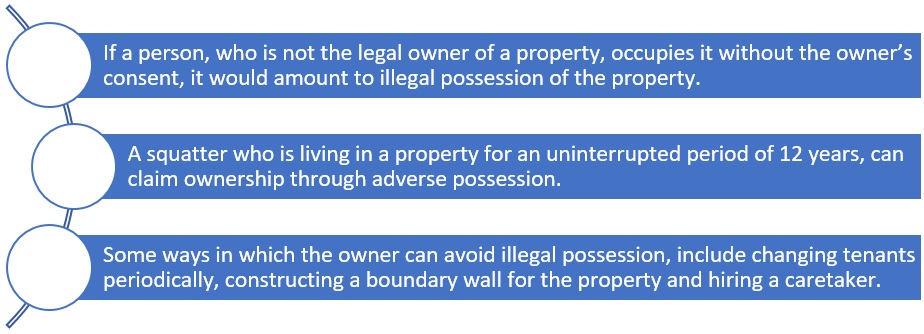Table of Content
▲
In India, a significant portion of land-related cases revolves around the issue of illegal property possession. Due to the substantial value of properties, there is a risk of them being unlawfully occupied by individuals with nefarious intentions, especially when left unattended. Unscrupulous entities may resort to forging legal documents to falsely establish their ownership over a property. Among various types of land, plots are particularly susceptible to unlawful possession, given their larger scope for illegal occupation.

What is illegal property possession?
Occupying a property without the legal owner's consent constitutes illegal possession. However, if the occupant has obtained permission from the owner to use the premises, the arrangement is legally valid. This is why properties are often leased or licensed to tenants through formal agreements. In such lease and license agreements, the landlord grants the tenant limited rights to use the property for a specified duration. If the tenant continues to inhabit the premises beyond this agreed timeframe, it would be considered illegal possession of the property.
What is adverse possession?
If a tenant persists in occupying a property for a duration surpassing 12 years, the law grants them the right to continue possessing the property, a legal concept known as adverse possession. If a property owner fails to assert their claim over the property within a 12-year period, an individual squatting on the property can establish legal rights over it. The provisions regarding adverse possession are outlined in the Limitation Act of 1963.
A recent judgment from the Punjab & Haryana High Court emphasizes that the state can acquire land through adverse possession, emphasizing that such cases should be treated as rare and exceptional.
In a more recent ruling, the Supreme Court has clarified that a prolonged period of possession alone does not automatically confer the right of adverse possession.
Also Read: How to file TDS on property in 2024?
How to deal with illegal possession?
Property owners must not only contend with external entities but also monitor their tenants diligently to prevent their property from being susceptible to fraudulent activities. Here are some precautionary measures to safeguard against such incidents:
Make frequent visits
It is evident that unattended properties, particularly those in prime locations, are likely to draw the interest of land mafias and criminals. While ensuring the physical security of the property through measures such as constructing a boundary wall is crucial, consistent visits are equally essential. Unless a reliable caretaker has been employed, it is advisable to conduct regular personal inspections.
Thoroughly screen tenants
If media reports are indicative, numerous property owners find themselves in predicaments due to dishonest tenants. Often, the root cause of this issue can be linked to the landlord's neglect in thoroughly screening the tenant. Failing to diligently verify the tenant's identity and occupation can lead to significant problems in the future. While earning rent may be the straightforward aspect of property ownership, retaining that ownership could pose a formidable challenge. Adhering to this principle, conduct all requisite checks meticulously, without compromising on thoroughness in the name of courtesy.
Also Read: Section 80EEA: Tax deduction for repayment of home loans
Keep changing tenants
In view of the aforementioned legal limitation, it becomes important for a landlord to change their tenants from time to time. This is also why most landlords provide their homes for rent only for 11 months, and, subsequently, renew the rent agreement in case they are comfortable with prolonging the stay of their existing tenant.
Get a boundary wall constructed
The primary step for plots and land parcels involves the construction of a boundary wall. This is a necessary measure regardless of the owner's proximity to the location. Ideally, the establishment of a housing unit can further reduce the potential for interference from unscrupulous individuals. For those residing at a distance from the property, assigning someone the responsibility to make regular visits is essential to ensure it remains free from illicit activities. While it may not always be feasible, engaging a caretaker proves to be an effective method to prevent unauthorized occupation, particularly for non-resident Indian (NRI) plot owners.
Mount a warning signboard
Apart from the fencing, you must also guard your private property with a no-trespassing signboard. The signboard must clearly mention that this is a private property belonging to you and that action will be taken against trespassers.
Also Read: Property frauds: Nine indicators that you are about to fall into a trap
Keep an eye on your rented property
This year, the media extensively covered incidents where elderly landlords in Noida were compelled to stage a sit-down protest in front of their homes with their belongings, as a form of protest against tenants refusing to vacate their properties. There is a valuable lesson for all landlords in the distress experienced by the elderly couple. Tenant verification is not a choice, and safeguarding tenancy is imperative through the registration of rent agreements.
Even if you have secured a reasonably responsible tenant who consistently pays rent and maintains the property, it's essential not to become complacent. Maintain a vigilant eye on your property and establish your presence through regular visits without causing any disruption to the tenant. If the property is located outside your city or country, and regular visits are impractical, consider hiring someone or appointing someone in charge to fulfill your responsibilities. You can never be too cautious when it comes to property management.
Insist on rent agreement registration
To save cost and avoid procedural hassles, landlords often go for 11-month rent agreements that don’t require registration. According to legal experts, this short-cut may prove to be quite problematic in the face of an adverse event. An unregistered rent agreement is not a documental proof, as far as the law is concerned. In your best interest, keep it legal, and get the rent agreement registered.
Also Read: Property frauds: Nine indicators that you are about to fall into a trap
Legal action against illegal possession of property
Those who have been at the receiving end of an illegal activity, can seek relief under various provisions of the Indian law.
First, you should file a written complaint with the city’s superintendent of police (SP), where the property is located. In case the SP fails to acknowledge the complaint, a personal complaint in the court concerned can be filed.
You could also file a police complaint about the same. Keep a copy of the FIR safe for future references. The authorities will be obliged to take action under Section 145 of the Code of Criminal Procedure (CRPC).
You could seek relief under Sections 5 and 6 of the Specific Relief Act, under which a person dispossessed of his property may recover his right, by proving previous possession and subsequent illegal dispossession.
Various sections of IPC applicable in such situations
Section 441
This section defines criminal trespass.
What is criminal trespass?
“Whoever enters into or upon property in the possession of another with intent to commit an offence or to intimidate, insult or annoy any person in possession of such property, or having lawfully entered into or upon such property, unlawfully remains there with intent thereby to intimidate, insult or annoy any such person, or with intent to commit an offence, is said to commit ‘criminal trespass’.”
Section 425
This section deals with mischief.
What is mischief?
“Whoever with intent to cause, or knowing that he is likely to cause, wrongful loss or damage to the public or to any person, causes the destruction of any property, or any such change in any property or in the situation thereof destroys or diminishes its value or utility, or affects it injuriously, commits ‘mischief’.”
Section 420
This section deals with cheating and dishonestly inducing delivery of property.
What is cheating and dishonestly inducing delivery of property?
Anyone engaging in deceit and, through dishonest means, causing the deceived individual to hand over any property to another person or to create, modify, or destroy a valuable security, or any document that is signed or sealed and can be transformed into a valuable security, shall face imprisonment for a period that may extend up to seven years. Additionally, they will be subject to a fine.
Section 442
This section deals with house trespass.
What is house trespass?
“Whoever commits criminal trespass by entering into or remaining in any building, tent or vessel used as a human dwelling or any building used as a place for worship, or as a place for the custody of property, is said to commit ‘house-trespass’.”
Section 503
This section deals with criminal intimidation.
What is criminal intimidation?
Anyone who intimidates another by threatening harm to their person, reputation, or property, or to the person or reputation of someone they care about, with the intention of causing fear or prompting the person to perform an action they are not legally obligated to do, or refrain from an action they are legally entitled to do, for the purpose of avoiding the execution of the threat, is guilty of committing criminal intimidation.
Also Read: Who Can Challenge a Will, How to Do So, and Other Details
State-centric remedies
Various states have put in place separate remedial agencies, to deal with cases of land grabbing and property frauds. In Uttar Pradesh, for example, you can approach the Anti-Land Mafia Task Force. You have the option to register your complaint at jansunwai.up.nic.in/ABMP.html.
Important court orders
Husband buying property in wife’s name not always benami transaction: HC
June 9, 2023: A husband supplying the money to her wife for property purchase does not necessarily make the transaction a benami one, the Calcutta High Court (HC) has ruled. For the transaction to qualify as benami transaction, the intention of the husband behind providing this monetary support is crucial, the HC said in an order dated June 7, 2023
Photocopy of sale deed can’t be accepted as surety: Allahabad HC
June 5, 2023: The photocopy of a sale deed is not admissible as surety under Section 17 of the Provincial Small Causes Court Act, 1887, the Allahabad High Court has ruled. Section 17 of the Act provides that security may be realised in manner provided in Section 145 of the Code of civil Procedure (CPC). Section 145 of the CPC deals with enforcement of liability of surety.
Also Read: Crafting Your Legacy: A Step-by-Step Guide to Writing a Property Will


_1770632737.webp)






Ans 1. A person who is not the original owner, can claim adverse possession of a property, if he has been in possession of the property for a minimum of 12 years, during which the owner takes no legal effort to evict him.
Ans 2. Possession refers to the act of gaining or exercising physical control or custody of the property.
Ans 3. A transfer of possession refers to a change or lapse in the possession of an asset.